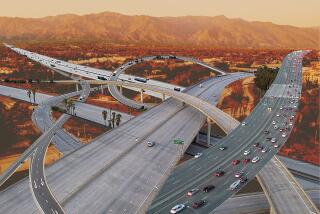OCCUPATION: RADIO TRAFFIC REPORTER
- Share via
Name: Andi Lauren
Company: Air Traffic Communications, Santa Ana
Thumbs up: “There’s definitely an art to traffic reporting. I really enjoy the adrenaline rush that you get while putting together a report. There’s an urgency to get the facts over the air as accurately as possible before the listener has to sit in the backup.”
Thumbs down: “I recently moved out of Orange County into West Los Angeles. Now I drive in traffic about two hours a day, then I get to work and talk about it for five hours. Like everyone else, I hate sitting in traffic.”
Next step: “I really enjoy doing traffic for radio, but I would love to work my way into the world of television, maybe doing traffic or yet another talk show.”
Advice: “Stay focused with what you want to do and don’t give up. Broadcasting is a very competitive business. Don’t plan on making a fortune and definitely don’t plan on being an overnight success.”
Salary range: $15,000 a year and more, depending on experience.
Hours: Traffic reporters work a four- to five-hour shift, five days a week.
Educational and training requirements: “It’s important to have a knowledge of the freeways and a nice, pleasant voice. Previous broadcasting experience is helpful. A college education is always a plus, because you get paid more.”
Expected demand: Slight, because of a low turnover rate.
Job description: “I am a traffic reporter and a radio producer on the midday shift. I gather traffic information by monitoring several California Highway Patrol scanners and by keeping in touch with CHP headquarters in Orange County, L.A. and the Inland Empire. I take information from listeners, and our local react monitors, who drive the freeways and report trouble. We also have a computer that is linked with Caltrans that tells me where the slow spots are on the highways. After gathering the data, I compile it into a report that lasts about 45 seconds. I give about nine of these every hour and they are broadcast simultaneously to several stations.”
Major employers: Radio and television stations and independent traffic reporting services.
For more information: Saddleback College in Mission Viejo offers training in radio reporting through its communication arts program. Advanced students polish their broadcasting skills by reporting for KSBR, the college’s radio station. Call (714) 582-4714. Researched by JANICE L. JONES / Los Angeles Times
More to Read
Sign up for Essential California
The most important California stories and recommendations in your inbox every morning.
You may occasionally receive promotional content from the Los Angeles Times.













